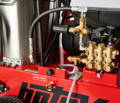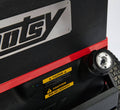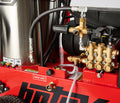How to Choose the Right Pressure Washer for my Start Up
Published:
02/27/2023

Pressure Washing Terminology
PSI
PSI measures the amount of pressure applied when cleaning a surface. This factor varies between models providing you different options for your specific pressure washing needs.
PSI Breakdown
Cleaning with 1000 PSI: Light Duty Pressure Washer
Recommended Uses: BBQ grills, outdoor furniture, bikes, scooters, as well as any vehicles in the driveway.
Cleaning with 2000 PSI: Medium Duty Pressure Washer
Recommended Uses: BBQ grills, outdoor furniture, bikes, scooters, cars, decks or docks, fencing, small boats and trailers.
Cleaning with 3000 PSI: Heavy Duty Pressure Washing
Cleaning with 4000 PSI: Industrial Duty Pressure Washing
PSI Breakdown by Application
- Concrete Cleaning: 3,000 - 3,500 PSI
- Car Cleaning:1,200 - 1,900 PSI
- Wood Cleaning: 2000 - 3,000 PSI
- Trucks & Tractors: 1,800+ PSI
- Livestock Shelters: 3,000+ PSI
- Decks, Fences, & Siding: 2,000+ PSI
- Paint Stripping: 3,200 - 4,200 PSI
- Construction-Site Maintenance: 3,200 - 4,200 PSI
- Graffiti Removal: 3,200 - 4,200 PSI
GPM
The higher the GPM, the more surface area a pressure washer can clean in a minute.
If machine A has a 2 GPM rating and machine B has a 4 GPM rating, machine B will clean twice as fast because it uses 2x’s as much water every minute for cleaning.
CU
Let’s take for example a 4 GPM machine at a PSI value of 3,000 will have a CU of 12,000.
Comparing that to a 3 GPM machine at a higher PSI value of 3,500, the CU will be 10,500.
Even though this machine has a higher PSI, the first machine will get the job done faster due to a higher GPM.
RPM
VHP
WHP
If there is a pressure drop from system components (valves, heat exchangers, filters or strainers), WHP assists the pump to achieve the desired flow rate.
BHP
Direct vs Belt
Direct Drive Pump
Belt Drive Pump
Stationary vs Portable
Stationary
Portable
If you can’t bring the equipment to the pressure washer and don’t want the hassle of cords, then a portable washer is the way to go.
Cordless pressure washers run on batteries, so they are quiet like electric washers and mobile like gas washers. Small portable pressure washer units are lightweight and mounted to an easy-to-maneuver trolley, so you can easily clean in corners and narrow spaces.
Hot vs Cold
Hot Water Pressure Washer
Cold Water Pressure Washer
Gas vs Electric vs Diesel
Gas Engine Pressure Washer
Electric Powered Pressure Washer
Diesel Engine Pressure Washer
Rental vs Buying
When to Rent
Know your needs — when determining what type of pressure washer to rent, you need to thoroughly understand your pressure washing needs. There are tons of features and models to choose between, from hot vs cold to electric vs gas.
Look for training availability — going with a rental place that is ready and able to train you on the equipment you're about to rent is very important. Proper use ensures that you're getting the most out of your experience, and the equipment is safe from accidental damage and harm (that can cost you much more than just the rental fee).
Shop around — there are always weekend specials and deals going on. Take advantage of your options. Shop for the best rental prices and deals for what you need. This is especially true for rental outlets, where discounts are plenty generous more often than not.
With that being said, going the rental route makes the most sense if you're testing out equipment to determine which one is the best fit for you.
Share this Article ↓





